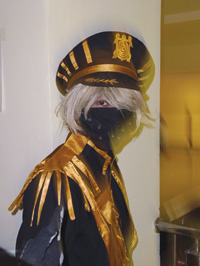Excerpt
Zaphy: I have been observing all these cosplayers who are so much into their characters. Why are they so much into them? Can you explain that to me?
Bonni: My theoretical viewpoint on this comes from psychoanalysis. Even when you are acting out “self” in daily life, you are already impersonating a character. And this is especially the case when you are talking about creative works like literature or in costume play—the character simply helps bring us into a matrix of fantasies. If we can get into the character it is much easier to start experiencing an imaginary world. And the next question would be as follows—now that we are into this character and we are looking back, is there still such a thing as real life? So once we get into the fantasy matrix through a character, the character really starts shaping our perception of reality as well. I believe that costume play crystallizes this aspect of fictionalization in art. It is as Zizeck once said, “the trick is not to see an illusion behind reality, but inside reality.”
Zaphy: Can you explain how these acts of impersonation are empowering for Indonesian youth?
Bonni: It is just a different language to express meaningful emotions and ideas. It cannot be expressed in another language. It is like finding the right words or gestures to tell somebody that you love them, because if you would tell them plainly, it may not convey the right meaning to them. And if people would confront you about your strange use of language, you can always distance yourself from it and tell them it was not you.
Zaphy: I heard that the cosplay fad started here about five years ago? Are people using it to express things that they could not say or state in other ways?
Bonni: Well, yes, but it is also a safe zone for youth to make statements. The events are now supported by the government and also by corporations who make big money out of it. For instance in the event Poppish Lovish, the audience is required to text a message to vote for their favorite character; so the audience also gets involved in the fantasy matrix, but the money goes to the company, as they will take away some of the phone credit beyond the price of a regular message. That is why these companies support the events.
Zaphy: Do cosplayers then invite their friends to vote for them?
Bonni: Yes, of course. And that reveals a hypocrisy behind these attempts at democratization of youth culture, as those people with upper-class or middle-class friends can of course receive more votes.
Zaphy: Would you generally say that the cosplay culture caters to the privileged class in Indonesia?
Bonni: Yes, I would think so. And five years ago there was really not much of a community either but now it has opened up quite a bit. Take myself as an example, for instance; I have been interested in animation for ages and I make my own comic strips and I have done a lot of research about cosplay, but I realized that it would be really expensive to get involved. You have to buy all the materials and make your own costumes. It is not uncommon for costume players to spend USD500 on one costume. Of course that is a lot of money for Indonesia, as it would be for many other cultures. You can buy cheaper cosplay clothing, but there is a bit of snobbery among the players about those who would walk around in these “inferior” costumes.





